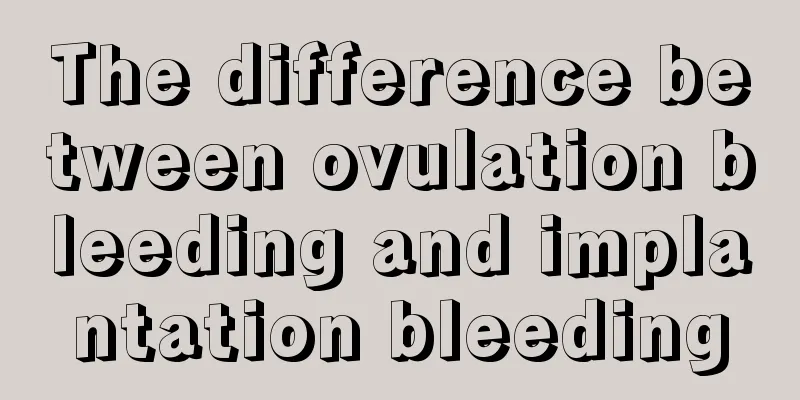The difference between ovulation bleeding and implantation bleeding

|
Ovulation bleeding is different from menstruation. It mainly occurs about 14 days before menarche. It is a normal physiological phenomenon with individual differences. Implantation bleeding is a condition in which a small number of women experience some bleeding after the embryo implants, but not everyone experiences this condition. So, what is the difference between ovulation bleeding and implantation bleeding? The following editor will give you a detailed introduction. The difference between ovulation bleeding and implantation bleeding There is no significant difference in symptoms between ovulation bleeding and implantation bleeding. Generally speaking, ovulation bleeding and implantation bleeding occur at different times. Ovulation bleeding occurs when the egg is discharged, while implantation bleeding generally occurs after the sperm and egg, which is about a week after ovulation bleeding. Generally, both bleeding will not be excessive and will stop on their own. If bleeding continues, you should also consider the possibility of inflammation or infection. Ovulation bleeding refers to the periodic vaginal bleeding in the middle and late menstrual period, that is, the ovulation period, due to the temporary decrease in estrogen levels, the uterine wall loses the support of hormones and part of the uterine wall falls off, causing periodic vaginal bleeding, which is called ovulation bleeding. The bleeding will be relatively more than implantation bleeding. Embryo implantation occurs about 6 days after fertilization. At this time, most pregnant women do not have very obvious reactions, and a few women will have some bright red or light pink blood stains, which is called implantation bleeding. Not everyone has this condition, so it is not a significant pregnancy phenomenon. If the woman is ovulating during sexual intercourse and the man has good sperm motility, pregnancy can usually be achieved within 24 to 48 hours, and the woman will not feel anything when the embryo implants! However, only a small number of people will bleed a small amount when the embryo implants due to physiological and physical problems. Implantation bleeding occurs about 1 week into pregnancy. If it is 7 to 10 days since ovulation, then it can be suspected that the embryo has implanted. You can go to the hospital for examination. If it is more than 12 days since ovulation, it may be menarche. |
<<: How much does breast ultrasound cost
>>: Left breast hypoechoic nodule category 3
Recommend
What are the symptoms of appendicitis in women?
Appendicitis is a relatively common disease in wo...
【World Sleep Day】How can we get a good night’s sleep?
· March 21 World Sleep Day· March 21, 2023 is &qu...
What to eat is good for breast development
Women with full breasts are always more likely to...
Explanation of the ovulation test paper showing a positive result after ovulation
Female friends have an ovulation period every mon...
Can I eat grapefruit if I have a cold uterus?
Uterine cold can be very stressful for female fri...
How to clean private parts
The hygiene of the private parts is very importan...
Is it good to take a shower during menstruation?
Taking a bath is something we must do in our live...
How long does it take for brown discharge to occur?
When the due date is approaching, many women will...
Why do people drink ice beer when eating crayfish, but no one drinks ice liquor?
After a week of hard work, how do you plan to tre...
12 weeks pregnant, doctor says it's a girl
Generally speaking, the 12th week of pregnancy is...
Ovarian cancer frequently "attacks" women, and abdominal pain is only one of the symptoms
Ovarian cancer has now become a common disease am...
Symptoms of anemia in early pregnancy
Anemia occurs in many women because most women ha...
What to do if a woman has high testosterone
Androgens are also known as male hormones. Male a...
Can I eat winter dates during my period?
Winter dates are also called green dates. Unlike ...
Can I eat barbecue when I am three months pregnant?
Nowadays, many people like to eat hot pot very mu...









